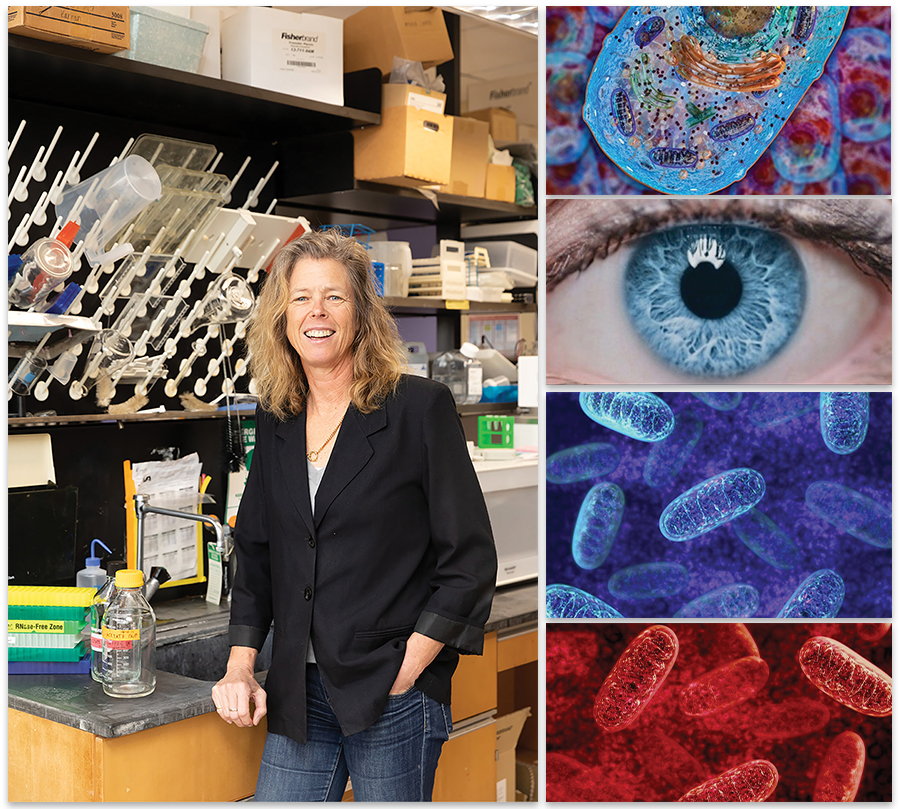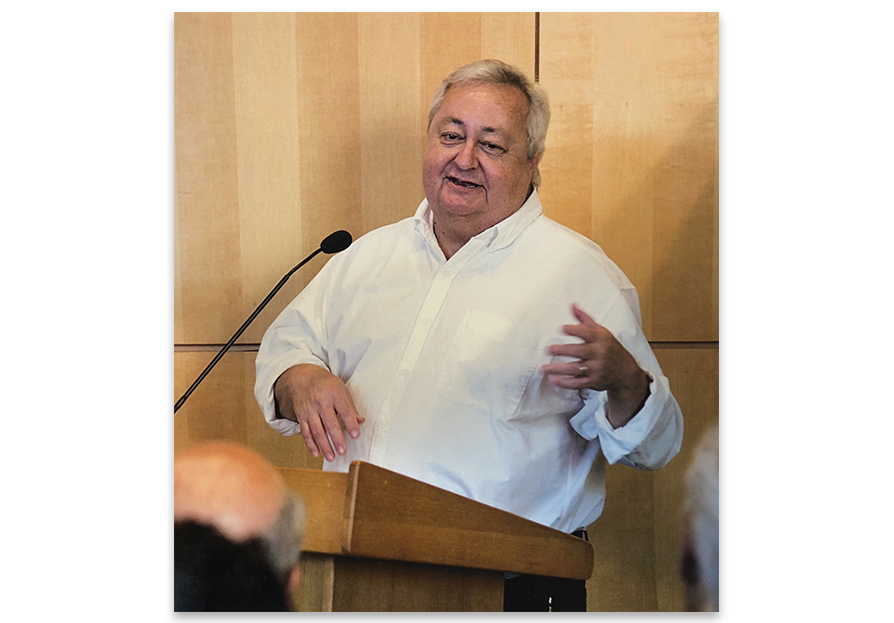
(Left) MUSC neuroscientist Bärbel Rohrer, who holds 11 US patents, is working to gain FDA approval for eye drops that can prevent blindness; (right, top to bottom) MitoChem works to increase mitochondrial metabolism—energy production in cells—and slow the progression of incurable eye diseases, such as macular degeneration.
WRITTEN BY Melissa Delaney
Bärbel Rohrer has had a central focus throughout her career: how the retina works, how it degenerates, and what can be done to prevent degeneration. The MUSC neuroscientist, professor, SmartState Endowed Chair in ophthalmology, and MitoChem Therapeutics co-founder and chief scientific officer has spent the last decade exploring mitochondrial metabolism—essentially energy production in cells. “Pretty much every retinal disease I’ve ever looked at, whether it’s retinitis pigmentosa or glaucoma or dry age-related macular degeneration, the mitochondrial metabolism goes down,” Rohrer explains.
The work at MitoChem has been dedicated to reversing that—delivering more energy to tissues to improve function. The idea, she says, is to slow the progression of incurable diseases like macular degeneration, the most common cause of age-related vision loss, affecting nearly 200 million people worldwide. “We can’t fix it,” she says. “We can’t cure the genetic underlying deficits. But if we can give people a prolonged life-span of their photoreceptors (the light-sensitive cells of the retina), they might be able to see their grandkids.”
In 2005, a few years after landing in Charleston from Germany (with stops at the University of Calgary and the University of California at San Francisco for her doctoral and postdoctoral studies), Rohrer attended a work dinner at Rita’s on Folly Beach. There, she struck up a conversation with Dr. Craig Beeson, a fellow MUSC scientist seated next to her. “I told him that I wanted to find a molecule to improve mitochondrial metabolism, and he said, ‘Oh, I can help you with that.’”
Thus began a 14-year collaboration. Some of the diseases they targeted have little to no treatment. Others rely on invasive options, like monthly eye injections, a grim prospect for those facing decades or even a lifetime of treatments. So the pair set out to identify small molecules that can improve mitochondrial metabolism and deliver them via eye drops. Together, they wrote and submitted a grant to the National Institutes of Health, which responded that it couldn’t be done.
Frustrated, they shared the grant with the Foundation Fighting Blindness, an organization that funds research toward the prevention, treatment, and cures of degenerative retinal diseases. “They literally asked us to submit a grant in two weeks,” Rohrer says. “Pretty short notice, but we did it, and they gave MitoChem a million dollars to get started.”
With the five-year grant (2008 to 2013) from Foundation Fighting Blindness, along with funding from an anonymous donor with retinitis pigmentosa, they identified thousands of molecules, some in the public domain and others they developed and patented. As one of the first occupants of the MUSC Innovation Center on Meeting Street, Dr. Beeson, Dr. Rohrer, and another MUSC scientist Dr. Rick Schnellmann co-founded the biotech start-up MitoChem Therapeutics, where they developed the eye drops, which have shown “proof of concept” in animal models and are now progressing toward human trials.
In November 2019, Beeson fell ill and went to the hospital. Ten days later, on Thanksgiving, he passed away at age 60. “It’s so difficult when suddenly one person that was 50 percent of the knowledge of the company has gone,” Rohrer says. “He was the chemist, the mitochondrial biologist, and I was the neuroscientist and retinal biologist. I can run circles around you explaining how the retina works, and Craig could run circles around me on mitochondria and medicinal chemistry. So it’s been a real challenge to move forward without him.”

Rohrer and fellow MUSC scientist Dr. Craig Beeson spent 14 years developing their patented eye drops and founding MitoChem Therapeutics until Beeson’s untimely death in 2019.
Fortunately, the compound for the eye drops had already been chosen. And Beeson’s wife, Gyda, a scientist who was instrumental in characterizing and testing the compounds, is now co-owner of MitoChem along with Rohrer and Schnellmann. “So we can move forward, but it would be so much more fun, more rewarding with him,” Rohrer says.
No rookie when it comes to inventions and entrepreneurship, Rohrer holds 11 US and 81 international patents with another five applications pending, and her discoveries have been licensed by three biotech start-ups. She won MUSC’s Inventor of the Year award in 2013, was named a National Inventors Academy fellow the following year, and was one of 10 members of The Ophthalmologist “Power List 2019” in the inventors category. However, the team still faces a steady uphill climb.
“Biotechnology—drug development—is a very, very expensive undertaking,” says Rohrer, noting it can take hundreds of millions of dollars for research leading to FDA approval. It’s been even more challenging to raise funds since the pandemic because there are so few in-person meetings and networking is the lifeblood of her work. MitoChem has secured an additional $1.5 million from clinical research organization Ichor Life Sciences, but it’s an ongoing struggle to continue to find funding, particularly in a smaller city like Charleston.
“That’s what scientists do. They have ideas, but they can’t do it by themselves. So they go out,” she says. “They go to conferences, they give presentations, and they sit next to somebody at Rita’s and start a conversation about what they’re interested in. And that is how you build you build a network and develop new ideas.”
Images by Aleece Sophia & courtesy of MitoChem Therapeutics